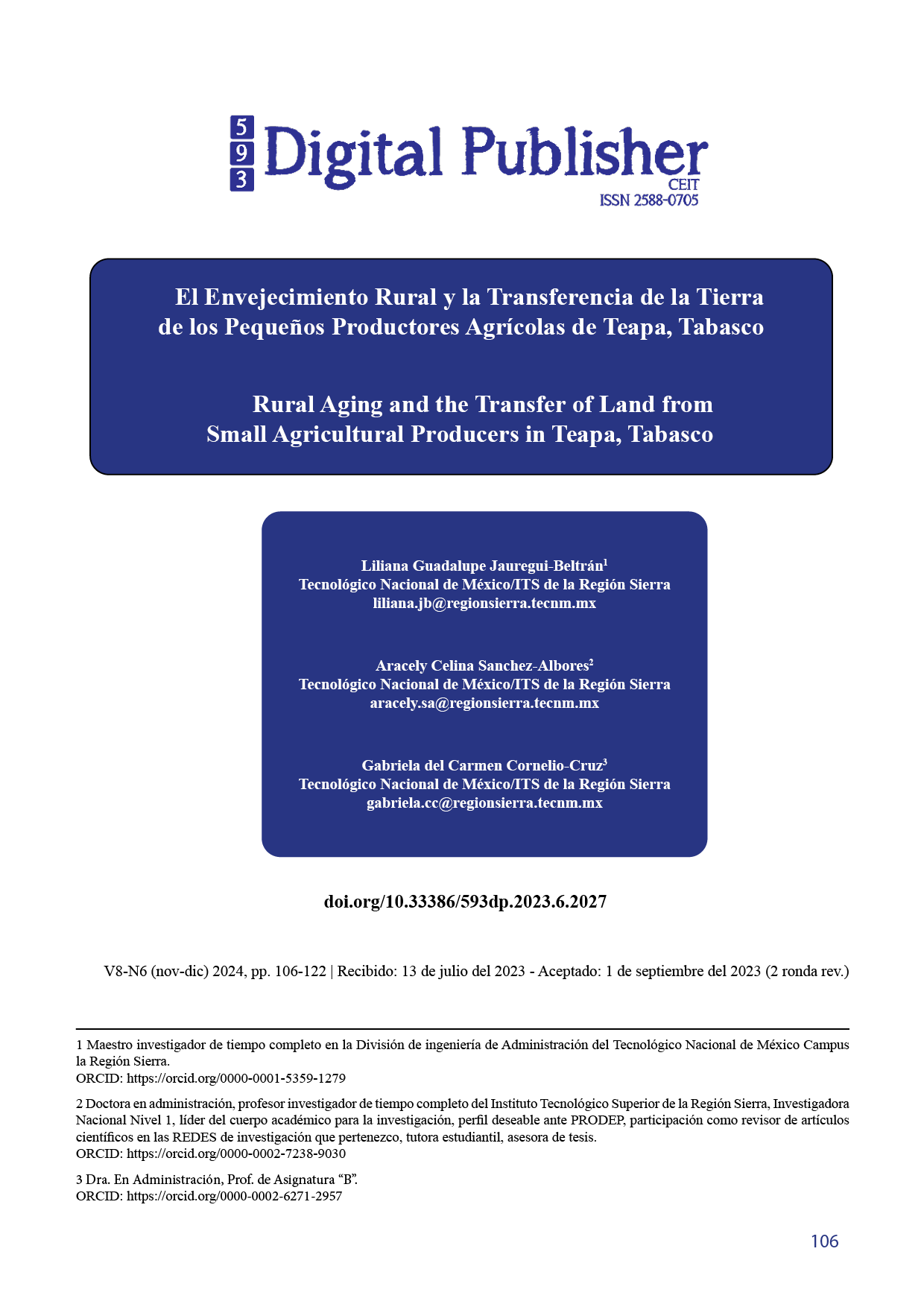Rural Aging and the Transfer of Land from Small Agricultural Producers in Teapa, Tabasco
Main Article Content
Abstract
The purpose of this work is to reflect on the impact that rural aging, land ownership and transfer is having on the development of agricultural activities of small producers in the municipality of Teapa, Tabasco, taking as selection criteria those localities in in which their predominant economic activity was agriculture, being elected: Arcadio Zentella, Colorado (Benito Juárez), Nicolás Bravo and Villa Juan Aldama. The convenience of the study arises from the importance that small producers have acquired in recent years as generators of the necessary food base to achieve food security for the population. The research was carried out under the exploratory and mixed study approach, using the participant observation technique and the survey, obtaining as a result that there is a high social and economic vulnerability among the producers derived from the problems of land transfer and aging. rural, since there is a controversial relationship between the aged ejidatarios and the young landless, generating a relationship of alliances, breaks and disagreements between two generations with different visions, arising the abandonment and sales of the lands, forcing migration at the hands of young work due to the lack of spaces and denial of rights by adult agricultural producers. This situation described is more vulnerable for rural women who continue to suffer from the culture of patriarchy, being excluded and limited in obtaining land possession rights. It is concluded that it is necessary to implement public policies of an inclusive nature, in which the needs of the new generations are taken into account and the active participation of young people and women is allowed, avoiding abandonment of the field and economic dependence on a program of government.
Downloads
Article Details

This work is licensed under a Creative Commons Attribution-NonCommercial-ShareAlike 4.0 International License.
1. Derechos de autor
Las obras que se publican en 593 Digital Publisher CEIT están sujetas a los siguientes términos:
1.1. 593 Digital Publisher CEIT, conserva los derechos patrimoniales (copyright) de las obras publicadas, favorece y permite la reutilización de las mismas bajo la licencia Licencia Creative Commons 4.0 de Reconocimiento-NoComercial-CompartirIgual 4.0, por lo cual se pueden copiar, usar, difundir, transmitir y exponer públicamente, siempre que:
1.1.a. Se cite la autoría y fuente original de su publicación (revista, editorial, URL).
1.1.b. No se usen para fines comerciales u onerosos.
1.1.c. Se mencione la existencia y especificaciones de esta licencia de uso.
References
Ceballos, S. y Nopal,G. (2021) «Estudio de autopercepción de pequeños productores agrícolas. El caso de Huichapan Hidalgo, México», Polis [En línea], 59 | 2021. URL: http://journals.openedition.org/polis/20510
Centro de Estudios para el Desarrollo Rural Sustentable y la Soberanía Alimentaria [CEDRSSA], (2020). Precios al productor agropecuario: situación actual y perspectivas. Recuperado en http://www.cedrssa.gob.mx/files/b/13/57PAT%202020%20-%202020-08-10%20Precios%20al%20productor%20agropecuario.pdf
Centro de Estudios Sociales y Opinión Pública, (2019). La relevancia de los ejidos y las comunidades rurales en la estructura social de México. Cuaderno de trabajo número 319. Cámara de Diputados LXIV legislatura. CESOP-IL-72-14-RelevanciaEjidos-20191230.pdf
Comisión Económica para América Latina y el Caribe (CEPAL), Centro Latinoamericano y Caribeño de Demografía (CELADE). (2007). Informe sobre la aplicación de la estrategia regional de implementación para América Latina y el Caribe del plan de acción internacional de Madrid sobre el envejecimiento. https://repositorio.cepal.org/handle/11362/21392?locale-attribute=en
Construyendo ciudades y comunidades amigables para poblaciones que envejecen. (2022, 29 de agosto). Instituto Nacional de las Persona Adultas Mayores. https://www.gob.mx/inapam/articulos/construyendo-ciudades-y-comunidades-amigables-para-poblaciones-que-envejecen
Chaves Montero, A.: "La utilización de una metodología mixta en investigación social". En: Kenneth Delgado, Santa Gadea, Walter Federico Gadea, Sara Vera - Quiñonez, coordinadores. Rompiendo barreras en la investigación. 1ª ed. en español. Machala :UTMACH, 2018. p. 164-184
Espejo, A. 2017. “Inserción Laboral de los Jóvenes Rurales en América Latina: Un breve análisis descriptivo. Grupos de Diálogo Rural, una estrategia de incidencia”. Serie documento Nº 225. Grupo de Trabajo Inclusión Social y Desarrollo. Programa Jóvenes Rurales, Territorios y Oportunidades: Una estrategia de diálogos de políticas. Rimisp, Santiago, Chile.
Espinoza, M. (2021, 01 de junio). Mujeres y tenencia de la tierra. ONU HABITAT. https://onuhabitat.org.mx/index.php/mujeres-y-tenencia-de-la-tierra
Envejecimiento, Desafíos globales (s.f.) Organización de las Naciones Unidas (ONU). https://www.un.org/es/global-issues/ageing
Envejecimiento. (s.f.). CELADE-División de población de la CEPAL. https://cepal.org/es/subtemas/envejecimiento#
FAO (S.f.) Serie Estudios sobre Tenencia de la Tierra. Dirección de Desarrollo Rural. https://www.fao.org/3/Y4307S/y4307s00.htm#Contents
González, R. y Aguilar, M. (2022). Diagnóstico de la movilidad humana en Tabasco. Coordinación del Centro de Estudios Migratorios. chrome-extension://efaidnbmnnnibpcajpcglclefindmkaj/https://portales.segob.gob.mx/work/models/PoliticaMigratoria/CPM/foros_regionales/estados/sur/info_diag_F_sur/diag_tabasco.pdf
Guiskin, M. (2019). Situación de las juventudes rurales en América Latina y el Caribe, serie Estudios y Perspectivas-Sede subregional de la CEPAL en México, N° 181 (LC/TS.2019/124-LC/MEX/TS.2019/31),México, Comisión Económica para América Latina y el Caribe (CEPAL)
Guterres, A. (2021). Día internacional de las mujeres rurales. CNDH México. https://www.cndh.org.mx/noticia/dia-internacional-de-las-mujeres-rurales-1
Hernández Basurto, S. Y. (2022). El papel de las juventudes en la búsqueda de la soberanía alimentaria. Diversidad, (22), 91 - 101. Recuperado a partir de https://www.idesmac.org/revistas/index.php/diversidad/article/view/114
Hernández González, O. (2021). Aproximación a los distintos tipos de muestreo no probabilístico que existen. Revista Cubana de Medicina General Integral, 37(3), e1442. Epub 01 de septiembre de 2021. Recuperado en 22 de junio de 2023, de http:+//scielo.sld.cu/scielo.php?script=sci_arttext&pid=S0864-21252021000300002&lng=es&tlng=es.
INEGI. (2023, 31 de mayo). Resultados oportunos del censo agropecuario 2022 (Comunicado de prensa). https://www.inegi.org.mx/contenidos/saladeprensa/boletines/2023/CA_ResOpt/CA_ResOpt2022.pdf
Información que cultiva y crece. (2023, 01 de abril). Secretaría de Desarrollo Agropecuario, Forestal y Pesca. https://campotabasco.gob.mx/
Instituto Nacional de las Mujeres (Inmujeres) (2020). Las mujeres y el acceso desigual a la propiedad de la tierra en México. Desigualdad en cifras. Año 6. Boletín No. 5, mayor de 2020. Disponible en: :http://cedoc.inmujeres.gob.mx/documentos_download/BA6N05.pdf
Lazos-Chavero, Elena, & Jiménez-Moreno, Marcela. (2022). Vulnerabilidades rurales a partir del envejecimiento entre nahuas del sur de Veracruz. Trace (México, DF), (81), 132-161. Epub 01 de enero de 2022. https://doi.org/10.22134/trace.81.2022.803
Ley Agraria. 26 de febrero de 1992. (México).
Los pequeños agricultores familiares producen alrededor de un tercio de los alimentos del mundo. (2021, 23 de abril). Organización de las Naciones Unidas para la Alimentación y la Agricultura. https://www.fao.org/news/story/es/item/1396597/icode/
Lopes Patarra, N. (1973). Transición demográfica: ¿Resumen histórico o teoría de población? Estudios Demográficos y Urbanos, 7(01), 86–95. https://doi.org/10.24201/edu.v7i01.231
López, F. (2017). El régimen de la propiedad agraria en México. Primeros auxilios jurídicos para la defensa de la tierra y los recursos naturales. Centro de Orientación y Asesoría a Pueblos Indígenas A.C., Centro de Estudios para el Cambio en el Campo Mexicano, Instituto Mexicano para el Desarrollo Comunitario A.C., Servicios para una Educación Alternativa EDUCA A.C.
López Hernández, E. (2022). Ley Agraria a tres décadas de su entrada en vigor. Revista latinoamericana de derecho social, (35), 101-125. Epub 07 de febrero de 2023.https://doi.org/10.22201/iij.24487899e.2022.35.17273
Manzano, F. (2016). La teoría de la transición demográfica y su inexactitud para América Latina. PERIODO 1950- 2000. Revista de Geografía (Recife). 33. 2016. https://www.researchgate.net/publication/311954502_LA_TEORIA_DE_LA_TRANSICION_DEMOGRAFICA_Y_SU_INEXACTITUD_PARA_AMERICA_LATINA_PERIODO_1950-_2000
Morett-Sánchez, J. Carlos, & Cosío-Ruiz, Celsa. (2017). Panorama de los ejidos y comunidades agrarias en México. Agricultura, sociedad y desarrollo, 14(1), 125-152. Recuperado en 16 de junio de 2023, de http://www.scielo.org.mx/scielo.php?script=sci_arttext&pid=S1870-54722017000100125&lng=es&tlng=es
Olivera, G., La reforma al artículo 27 constitucional y la incorporación de las tierras ejidales al mercado legal de suelo urbano en Mexico. Scripta Nova. Revista electrónica de geografía y ciencias sociales. Barcelona: Universidad de Barcelona, 1 de agosto de 2005, vol. IX, núm. 194 (33). http://www.ub.es/geocrit/sn/sn-194-33.htm
Organización de las Naciones Unidas para la Alimentación y la Agricultura (FAO,2018), México rural del Siglo XXI. http://www.fao.org/3/i9548es/I9548ES.pdf
Ortega, X. y Villamarín, F. J. (2013). Sociología, economía y dinámica de la población: una aproximación teórica y empírica al estudio de la transición demográfica. Tendencias, 11(1), 59–74. Recuperado a partir de https://revistas.udenar.edu.co/index.php/rtend/article/view/593
Ospina, C., 2019. Estudio de trayectorias y aspiraciones de jóvenes rurales en México, serie documento de trabajo N° 259. Rimisp Santiago Chile.
Pequeños productores, sostén de nuestra agricultura. (2021, 19 de marzo). Servicio Nacional de Sanidad, Inocuidad y Calidad Agroalimentaria y el Consejo Nacional Agropecuario. https://www.gob.mx/senasica/articulos/pequenos-productores-sosten-de-nuestra-agricultura
Ponce, G. (2018). La composición del ingreso de los pequeños productores agropecuarios. Centro de Estudios para el Desarrollo Rural Sustentable y la Soberanía Alimentaria. Palacio legislativo de San Lázaro. http://www.cedrssa.gob.mx/files/b/13/61Ingreso_peque%C3%B1os_productores.pdf
Ramírez-Juárez, J. (2022). Seguridad alimentaria y agricultura familiar en México. Revista Mexicana de Ciencias Agrícolas, 13(03). https://doi.org/10.29312/remexca.v13i3.2854
Ramos-Galarza, C. (2020). Los alcances de una investigación. Revista Ciencia Americana, vol. 9(3), julio-diciembre 2020. http://orcid.org/0000-0001-5614-1994
Rekalde, I., Vizcarra, M. T., & Macazaga, A. M. (2014). La Observación Como Estrategia De Investigación Para Construir Contextos De Aprendizaje Y Fomentar Procesos Participativos. Educación XX1, 17(1), 201-220.
Servicio Nacional de Sanidad, Inocuidad y Calidad Agroalimentaria (SENASICA,19 de marzo de 2021). Pequeños productores, sostén de nuestra agricultura. https://www.gob.mx/senasica/articulos/pequenos-productores-sosten-de-nuestra-agricultura
Soto, F. y Saramago, A., P. (2019). Migración y desarrollo rural en América Latina y el Caribe. Serie “2030 – Alimentación, agricultura y desarrollo rural en América Latina y el Caribe”, No. 26. Santiago de Chile. FAO. 22 p. Licencia: CC BY-NC-SA 3.0 IGO.
Suprema Corte de Justicia de la Nación. (1994). Diccionario Jurídico Mexicano. Biblioteca Jurídica Virtual (unam.mx)
Torres-Mazuera, G. (2023). El derecho a la tierra y la participación para mujeres y jóvenes rurales: la agenda pendiente de la política agraria en México. Fundación para el debido proceso. informe_derecho_acceso_a_tierra_y_participacion_mujeres_y_jovenes_mexico.pdf (dplf.org)
Turra, C. y Fernandes, F. La transición demográfica: oportunidades y desafíos en la senda hacia el logro de los Objetivos de Desarrollo Sostenible en América Latina y el Caribe, Documentos de Proyectos (LC/TS.2020/105), Santiago, Comisión Económica para América Latina y el Caribe (CEPAL), 2021.
Uribe, A. B., Covarrubias Cuéllar, K. Y., & Uribe Alvarado, J. I. (2009). La metodología mixta en un estudio sobre los ex braceros colimenses: una experiencia interdisciplinaria para comprender una realidad compleja. Estudios sobre las Culturas Contemporáneas, XV (30), 123-154.




